Skip to main content
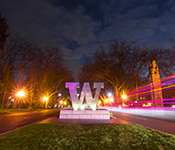 The Allen School has teamed up with the Allen Institute for AI (Ai2) on a new project aimed at developing the first fully open set of artificial intelligence tools to accelerate scientific discovery and enhance the United States' leadership in AI innovation. The U.S. National Science Foundation (NSF) and NVIDIA announced a combined investment of $152 million n the Open Multimodal AI Infrastructure to Accelerate Science (OMAI) project, including $75 million awarded through the NSF’s Mid-Scale Research Infrastructure program. Read more →
The Allen School has teamed up with the Allen Institute for AI (Ai2) on a new project aimed at developing the first fully open set of artificial intelligence tools to accelerate scientific discovery and enhance the United States' leadership in AI innovation. The U.S. National Science Foundation (NSF) and NVIDIA announced a combined investment of $152 million n the Open Multimodal AI Infrastructure to Accelerate Science (OMAI) project, including $75 million awarded through the NSF’s Mid-Scale Research Infrastructure program. Read more →
August 14, 2025
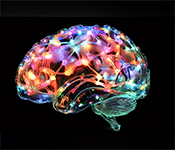 Understanding how different parts of the brain communicate is like trying to follow conversations at a crowded party. Neuroscientists face a similar challenge: even when they can record signals from multiple brain regions, it is difficult to figure out who is “talking” to whom and what is being said. In a recent paper published at the 2025 International Conference on Machine Learning (ICML), a team of researchers led by Allen School professor Matt Golub developed a new machine learning technique called Multi-Region Latent Factor Analysis via Dynamical Systems (MR-LFADS) to decode how different parts of the brain talk to each other even when some parts can’t be directly observed.
Read more →
Understanding how different parts of the brain communicate is like trying to follow conversations at a crowded party. Neuroscientists face a similar challenge: even when they can record signals from multiple brain regions, it is difficult to figure out who is “talking” to whom and what is being said. In a recent paper published at the 2025 International Conference on Machine Learning (ICML), a team of researchers led by Allen School professor Matt Golub developed a new machine learning technique called Multi-Region Latent Factor Analysis via Dynamical Systems (MR-LFADS) to decode how different parts of the brain talk to each other even when some parts can’t be directly observed.
Read more →
August 12, 2025
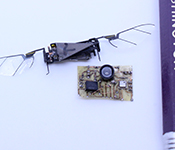 Flying insect robots (FIRs) have the potential for use in search and rescue operations, environmental monitoring and even space missions due to their small size and low material cost. The problem, however, is finding the minimum sensor suite and computation resources, or avionics, needed for the robot to maintain flight and control. Allen School undergraduates Joshua Tran and Claire Li didn’t let that challenge bug them — the two were part of a team in the UW’s Autonomous Insect Robotics Lab that earned the ICRA Best Student Paper for
TinySense, the current lightest avionics system with the potential for FIR sensor autonomy.
Read more →
Flying insect robots (FIRs) have the potential for use in search and rescue operations, environmental monitoring and even space missions due to their small size and low material cost. The problem, however, is finding the minimum sensor suite and computation resources, or avionics, needed for the robot to maintain flight and control. Allen School undergraduates Joshua Tran and Claire Li didn’t let that challenge bug them — the two were part of a team in the UW’s Autonomous Insect Robotics Lab that earned the ICRA Best Student Paper for
TinySense, the current lightest avionics system with the potential for FIR sensor autonomy.
Read more →
July 30, 2025
 The cardinality estimation problem, or the challenge of accurately predicting the size of the output to a query without actually evaluating the query, is one of the oldest and most important problems in databases and data management. Cardinality estimation helps guide decisions on every aspect of query execution, however, current methods can often have large errors, leading to poor decisions downstream. To address this, a team of researchers led by Allen School professor Dan Suciu of the UW Database Group introduced a new pessimistic cardinality estimator called LpBound which provides a guaranteed upper bound on the query output size, and received a SIGMOD Best Paper Award for their work.
Read more →
The cardinality estimation problem, or the challenge of accurately predicting the size of the output to a query without actually evaluating the query, is one of the oldest and most important problems in databases and data management. Cardinality estimation helps guide decisions on every aspect of query execution, however, current methods can often have large errors, leading to poor decisions downstream. To address this, a team of researchers led by Allen School professor Dan Suciu of the UW Database Group introduced a new pessimistic cardinality estimator called LpBound which provides a guaranteed upper bound on the query output size, and received a SIGMOD Best Paper Award for their work.
Read more →
July 24, 2025
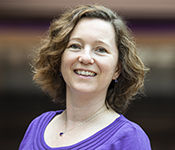 Magdalena Balazinska, professor and director of the Allen School, has been elected a member of the Washington State Academy of Sciences (WSAS) in recognition of her “contributions in data management for data science, big data systems, cloud computing, and image/video analytics and leadership in data science education.” The WSAS was established in 2015 as a source of independent, evidence-based scientific and technical advice for state policy makers, modeled after the National Academies of Science, Engineering and Medicine. Balazinska, who was directly elected by her WSAS peers, is one of 36 members in the 2025 class. Read more →
Magdalena Balazinska, professor and director of the Allen School, has been elected a member of the Washington State Academy of Sciences (WSAS) in recognition of her “contributions in data management for data science, big data systems, cloud computing, and image/video analytics and leadership in data science education.” The WSAS was established in 2015 as a source of independent, evidence-based scientific and technical advice for state policy makers, modeled after the National Academies of Science, Engineering and Medicine. Balazinska, who was directly elected by her WSAS peers, is one of 36 members in the 2025 class. Read more →
July 23, 2025
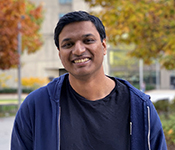 Allen School professor Abhishek Gupta is interested in developing ways to help robots learn new skills with minimal human help and engineering. Gupta joined the Allen School faculty in 2022, and already he has introduced research that has shaped the future of robotics. His contributions to the field earned him the IEEE Robotics & Automation Society (RAS) Early Academic Career Award in Robotics and Automation where the organization recognized him “for pioneering contributions to real world robotic reinforcement learning.”
Read more →
Allen School professor Abhishek Gupta is interested in developing ways to help robots learn new skills with minimal human help and engineering. Gupta joined the Allen School faculty in 2022, and already he has introduced research that has shaped the future of robotics. His contributions to the field earned him the IEEE Robotics & Automation Society (RAS) Early Academic Career Award in Robotics and Automation where the organization recognized him “for pioneering contributions to real world robotic reinforcement learning.”
Read more →
July 17, 2025
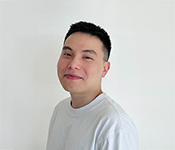 Allen School Ph.D. student Cheng-Yu Hsieh is interested in tackling one of the biggest challenges in today’s large-scale machine learning environment — how to make artificial intelligence development more accessible. Large foundation models trained on massive datasets have revolutionized AI, however, but these scaling efforts are often out of reach for many except for well-resourced companies. With support from a Google Ph.D. Fellowship, Hsieh is working to make data and model scaling more efficient and affordable to help democratize AI development. Read more →
Allen School Ph.D. student Cheng-Yu Hsieh is interested in tackling one of the biggest challenges in today’s large-scale machine learning environment — how to make artificial intelligence development more accessible. Large foundation models trained on massive datasets have revolutionized AI, however, but these scaling efforts are often out of reach for many except for well-resourced companies. With support from a Google Ph.D. Fellowship, Hsieh is working to make data and model scaling more efficient and affordable to help democratize AI development. Read more →
July 9, 2025
 A team of University of Washington and NVIDIA researchers developed a system that can help make large language models (LLMs) faster and more adaptable. The researchers introduced FlashInfer, a versatile LLM inference kernel library that is open source as well as highly optimized for new techniques including key-value cache reuse algorithms. They presented their research titled “FlashInfer: Efficient and Customizable Attention Engine for LLM Inference Serving” at the Eighth Annual Conference on Machine Learning and Systems (MLSys 2025) and received a Best Paper Award.
Read more →
A team of University of Washington and NVIDIA researchers developed a system that can help make large language models (LLMs) faster and more adaptable. The researchers introduced FlashInfer, a versatile LLM inference kernel library that is open source as well as highly optimized for new techniques including key-value cache reuse algorithms. They presented their research titled “FlashInfer: Efficient and Customizable Attention Engine for LLM Inference Serving” at the Eighth Annual Conference on Machine Learning and Systems (MLSys 2025) and received a Best Paper Award.
Read more →
July 1, 2025
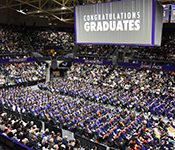 On Friday, June 13, an estimated 5,000 friends, family, faculty and staff packed the Alaska Airlines Arena in the University of Washington’s Hec Edmundson Pavilion to celebrate the Allen School’s graduating class of 2025. While the date invited superstition, the evening was full of jubilation as roughly 800 graduates collected their commemorative diplomas, flipped their tassels and made the transition from Allen School students to Allen School alumni — accompanied by words of wisdom and inspiration from Trish Millines Dziko, co-founder and executive director of the Technology Access Foundation (TAF). Read more →
On Friday, June 13, an estimated 5,000 friends, family, faculty and staff packed the Alaska Airlines Arena in the University of Washington’s Hec Edmundson Pavilion to celebrate the Allen School’s graduating class of 2025. While the date invited superstition, the evening was full of jubilation as roughly 800 graduates collected their commemorative diplomas, flipped their tassels and made the transition from Allen School students to Allen School alumni — accompanied by words of wisdom and inspiration from Trish Millines Dziko, co-founder and executive director of the Technology Access Foundation (TAF). Read more →
June 25, 2025
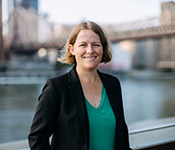 Since graduating from the Allen School, Nicki Dell (Ph.D., ‘15) has focused on using technology to “make our computing-mediated world safer and more equitable for everyone.” Her work combines the fields of human-computer interaction and computer security and privacy to improve the lives of overlooked communities, specifically those experiencing intimate partner violence and home health care workers. For her contributions, the Allen School recognized Dell with the 2025 Alumni Impact Award, honoring former students with exceptional records of achievement.
Read more →
Since graduating from the Allen School, Nicki Dell (Ph.D., ‘15) has focused on using technology to “make our computing-mediated world safer and more equitable for everyone.” Her work combines the fields of human-computer interaction and computer security and privacy to improve the lives of overlooked communities, specifically those experiencing intimate partner violence and home health care workers. For her contributions, the Allen School recognized Dell with the 2025 Alumni Impact Award, honoring former students with exceptional records of achievement.
Read more →
June 12, 2025
« Newer Posts — Older Posts »
 The Allen School has teamed up with the Allen Institute for AI (Ai2) on a new project aimed at developing the first fully open set of artificial intelligence tools to accelerate scientific discovery and enhance the United States' leadership in AI innovation. The U.S. National Science Foundation (NSF) and NVIDIA announced a combined investment of $152 million n the Open Multimodal AI Infrastructure to Accelerate Science (OMAI) project, including $75 million awarded through the NSF’s Mid-Scale Research Infrastructure program. Read more →
The Allen School has teamed up with the Allen Institute for AI (Ai2) on a new project aimed at developing the first fully open set of artificial intelligence tools to accelerate scientific discovery and enhance the United States' leadership in AI innovation. The U.S. National Science Foundation (NSF) and NVIDIA announced a combined investment of $152 million n the Open Multimodal AI Infrastructure to Accelerate Science (OMAI) project, including $75 million awarded through the NSF’s Mid-Scale Research Infrastructure program. Read more →

 The Allen School has teamed up with the Allen Institute for AI (Ai2) on a new project aimed at developing the first fully open set of artificial intelligence tools to accelerate scientific discovery and enhance the United States' leadership in AI innovation. The U.S. National Science Foundation (NSF) and NVIDIA announced a combined investment of $152 million n the Open Multimodal AI Infrastructure to Accelerate Science (OMAI) project, including $75 million awarded through the NSF’s Mid-Scale Research Infrastructure program. Read more →
The Allen School has teamed up with the Allen Institute for AI (Ai2) on a new project aimed at developing the first fully open set of artificial intelligence tools to accelerate scientific discovery and enhance the United States' leadership in AI innovation. The U.S. National Science Foundation (NSF) and NVIDIA announced a combined investment of $152 million n the Open Multimodal AI Infrastructure to Accelerate Science (OMAI) project, including $75 million awarded through the NSF’s Mid-Scale Research Infrastructure program. Read more →
 Understanding how different parts of the brain communicate is like trying to follow conversations at a crowded party. Neuroscientists face a similar challenge: even when they can record signals from multiple brain regions, it is difficult to figure out who is “talking” to whom and what is being said. In a recent paper published at the 2025 International Conference on Machine Learning (ICML), a team of researchers led by Allen School professor Matt Golub developed a new machine learning technique called Multi-Region Latent Factor Analysis via Dynamical Systems (MR-LFADS) to decode how different parts of the brain talk to each other even when some parts can’t be directly observed.
Read more →
Understanding how different parts of the brain communicate is like trying to follow conversations at a crowded party. Neuroscientists face a similar challenge: even when they can record signals from multiple brain regions, it is difficult to figure out who is “talking” to whom and what is being said. In a recent paper published at the 2025 International Conference on Machine Learning (ICML), a team of researchers led by Allen School professor Matt Golub developed a new machine learning technique called Multi-Region Latent Factor Analysis via Dynamical Systems (MR-LFADS) to decode how different parts of the brain talk to each other even when some parts can’t be directly observed.
Read more →
 Flying insect robots (FIRs) have the potential for use in search and rescue operations, environmental monitoring and even space missions due to their small size and low material cost. The problem, however, is finding the minimum sensor suite and computation resources, or avionics, needed for the robot to maintain flight and control. Allen School undergraduates Joshua Tran and Claire Li didn’t let that challenge bug them — the two were part of a team in the UW’s Autonomous Insect Robotics Lab that earned the ICRA Best Student Paper for
TinySense, the current lightest avionics system with the potential for FIR sensor autonomy.
Read more →
Flying insect robots (FIRs) have the potential for use in search and rescue operations, environmental monitoring and even space missions due to their small size and low material cost. The problem, however, is finding the minimum sensor suite and computation resources, or avionics, needed for the robot to maintain flight and control. Allen School undergraduates Joshua Tran and Claire Li didn’t let that challenge bug them — the two were part of a team in the UW’s Autonomous Insect Robotics Lab that earned the ICRA Best Student Paper for
TinySense, the current lightest avionics system with the potential for FIR sensor autonomy.
Read more →
 The cardinality estimation problem, or the challenge of accurately predicting the size of the output to a query without actually evaluating the query, is one of the oldest and most important problems in databases and data management. Cardinality estimation helps guide decisions on every aspect of query execution, however, current methods can often have large errors, leading to poor decisions downstream. To address this, a team of researchers led by Allen School professor Dan Suciu of the UW Database Group introduced a new pessimistic cardinality estimator called LpBound which provides a guaranteed upper bound on the query output size, and received a SIGMOD Best Paper Award for their work.
Read more →
The cardinality estimation problem, or the challenge of accurately predicting the size of the output to a query without actually evaluating the query, is one of the oldest and most important problems in databases and data management. Cardinality estimation helps guide decisions on every aspect of query execution, however, current methods can often have large errors, leading to poor decisions downstream. To address this, a team of researchers led by Allen School professor Dan Suciu of the UW Database Group introduced a new pessimistic cardinality estimator called LpBound which provides a guaranteed upper bound on the query output size, and received a SIGMOD Best Paper Award for their work.
Read more →
 Magdalena Balazinska, professor and director of the Allen School, has been elected a member of the Washington State Academy of Sciences (WSAS) in recognition of her “contributions in data management for data science, big data systems, cloud computing, and image/video analytics and leadership in data science education.” The WSAS was established in 2015 as a source of independent, evidence-based scientific and technical advice for state policy makers, modeled after the National Academies of Science, Engineering and Medicine. Balazinska, who was directly elected by her WSAS peers, is one of 36 members in the 2025 class. Read more →
Magdalena Balazinska, professor and director of the Allen School, has been elected a member of the Washington State Academy of Sciences (WSAS) in recognition of her “contributions in data management for data science, big data systems, cloud computing, and image/video analytics and leadership in data science education.” The WSAS was established in 2015 as a source of independent, evidence-based scientific and technical advice for state policy makers, modeled after the National Academies of Science, Engineering and Medicine. Balazinska, who was directly elected by her WSAS peers, is one of 36 members in the 2025 class. Read more →
 Allen School professor Abhishek Gupta is interested in developing ways to help robots learn new skills with minimal human help and engineering. Gupta joined the Allen School faculty in 2022, and already he has introduced research that has shaped the future of robotics. His contributions to the field earned him the IEEE Robotics & Automation Society (RAS) Early Academic Career Award in Robotics and Automation where the organization recognized him “for pioneering contributions to real world robotic reinforcement learning.”
Read more →
Allen School professor Abhishek Gupta is interested in developing ways to help robots learn new skills with minimal human help and engineering. Gupta joined the Allen School faculty in 2022, and already he has introduced research that has shaped the future of robotics. His contributions to the field earned him the IEEE Robotics & Automation Society (RAS) Early Academic Career Award in Robotics and Automation where the organization recognized him “for pioneering contributions to real world robotic reinforcement learning.”
Read more →
 Allen School Ph.D. student Cheng-Yu Hsieh is interested in tackling one of the biggest challenges in today’s large-scale machine learning environment — how to make artificial intelligence development more accessible. Large foundation models trained on massive datasets have revolutionized AI, however, but these scaling efforts are often out of reach for many except for well-resourced companies. With support from a Google Ph.D. Fellowship, Hsieh is working to make data and model scaling more efficient and affordable to help democratize AI development. Read more →
Allen School Ph.D. student Cheng-Yu Hsieh is interested in tackling one of the biggest challenges in today’s large-scale machine learning environment — how to make artificial intelligence development more accessible. Large foundation models trained on massive datasets have revolutionized AI, however, but these scaling efforts are often out of reach for many except for well-resourced companies. With support from a Google Ph.D. Fellowship, Hsieh is working to make data and model scaling more efficient and affordable to help democratize AI development. Read more →
 A team of University of Washington and NVIDIA researchers developed a system that can help make large language models (LLMs) faster and more adaptable. The researchers introduced FlashInfer, a versatile LLM inference kernel library that is open source as well as highly optimized for new techniques including key-value cache reuse algorithms. They presented their research titled “FlashInfer: Efficient and Customizable Attention Engine for LLM Inference Serving” at the Eighth Annual Conference on Machine Learning and Systems (MLSys 2025) and received a Best Paper Award.
Read more →
A team of University of Washington and NVIDIA researchers developed a system that can help make large language models (LLMs) faster and more adaptable. The researchers introduced FlashInfer, a versatile LLM inference kernel library that is open source as well as highly optimized for new techniques including key-value cache reuse algorithms. They presented their research titled “FlashInfer: Efficient and Customizable Attention Engine for LLM Inference Serving” at the Eighth Annual Conference on Machine Learning and Systems (MLSys 2025) and received a Best Paper Award.
Read more →
 On Friday, June 13, an estimated 5,000 friends, family, faculty and staff packed the Alaska Airlines Arena in the University of Washington’s Hec Edmundson Pavilion to celebrate the Allen School’s graduating class of 2025. While the date invited superstition, the evening was full of jubilation as roughly 800 graduates collected their commemorative diplomas, flipped their tassels and made the transition from Allen School students to Allen School alumni — accompanied by words of wisdom and inspiration from Trish Millines Dziko, co-founder and executive director of the Technology Access Foundation (TAF). Read more →
On Friday, June 13, an estimated 5,000 friends, family, faculty and staff packed the Alaska Airlines Arena in the University of Washington’s Hec Edmundson Pavilion to celebrate the Allen School’s graduating class of 2025. While the date invited superstition, the evening was full of jubilation as roughly 800 graduates collected their commemorative diplomas, flipped their tassels and made the transition from Allen School students to Allen School alumni — accompanied by words of wisdom and inspiration from Trish Millines Dziko, co-founder and executive director of the Technology Access Foundation (TAF). Read more →
 Since graduating from the Allen School, Nicki Dell (Ph.D., ‘15) has focused on using technology to “make our computing-mediated world safer and more equitable for everyone.” Her work combines the fields of human-computer interaction and computer security and privacy to improve the lives of overlooked communities, specifically those experiencing intimate partner violence and home health care workers. For her contributions, the Allen School recognized Dell with the 2025 Alumni Impact Award, honoring former students with exceptional records of achievement.
Read more →
Since graduating from the Allen School, Nicki Dell (Ph.D., ‘15) has focused on using technology to “make our computing-mediated world safer and more equitable for everyone.” Her work combines the fields of human-computer interaction and computer security and privacy to improve the lives of overlooked communities, specifically those experiencing intimate partner violence and home health care workers. For her contributions, the Allen School recognized Dell with the 2025 Alumni Impact Award, honoring former students with exceptional records of achievement.
Read more →
